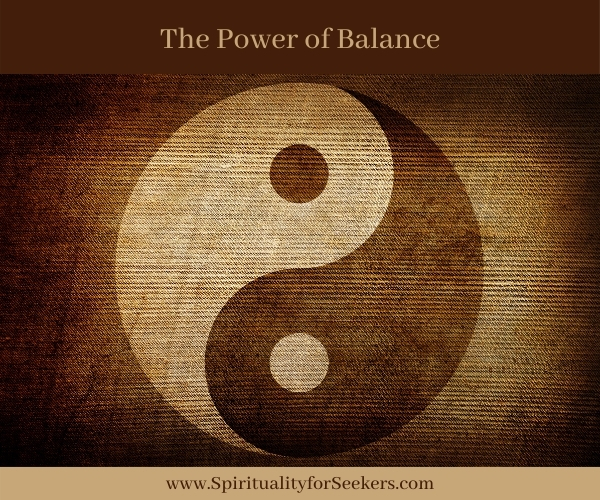
The word balance is used a lot in spiritual circles, but few truly understand that balance is an extremely powerful principle which can change the life of anyone who cares to apply it properly. Most often, we think of balance as being the central point of stillness between two opposing extremes, but it can also be thought of as the equal application of two or more beneficial approaches. On the surface, such approaches might appear very different or even oppositional, but when a balance is achieved between them, a resultant power is unleashed which far exceeds the sum of the parts.
To provide an example of this in mainstream terms, consider the oft-discussed work-life balance. We have all been raised to believe that we need to work hard to make a living in this world, but we also want to devote time to other things, such as developing ourselves and spending time with our loved ones.
Some people run into difficulties because they are either unaware of the work-life balance idea, or because they are aware of it and ignore it anyway. So there are some who become workaholics and amass wealth and status, only to see their health and relationships fall apart, and there are others who spend all of their time ‘living in the moment’ by doing whatever they please and then discovering that they don’t have enough money to pay the bills.
[Note: Our new series on The Spiritual Way to Success teaches a very different way of succeeding in life than by striving in the traditional materialistic manner, but this work-life balance idea is a good illustration of how two different activities can, when balanced, end up serving each other.]
When someone strikes a good balance between working and enjoying the non-work aspects of life, both of those activities tend to be more fruitful. A person will tend to enjoy work more, and therefore perform better at their job, when they also spend an adequate amount of time with their family and friends, and on personal development projects. Similarly, the time which is spent on personal development and social activities will be more enjoyable because they will also have a more comfortable level of income to support them than they might otherwise.
Key Areas to Focus On
Just as achieving a work-life balance can benefit both your work and your home life, so achieving balance in other key areas can bring incredible benefits to various aspects of your spiritual life, as follows:
1 – Study and Application
One of the most common traps that Seekers can fall into is that of spending so much time studying spiritual topics that they fail to apply what they already know. Think of the person who spends every spare moment poring over huge tomes of scripture or reading the latest meditation books but who never lives according to scriptural principles or sits down to meditate.
All study and no application is perfectly fine if you view spirituality as a purely intellectual or theoretical pastime, but if you want to actually develop yourself spiritually you need to make sure that the time you spend studying is balanced by the practical application of the things that you learn.
Remember, just as reading about swimming will never give you the ability to swim in practice, so simply being familiar with spiritual ideas will not make you any more spiritually mature than you were at the outset.
2 – Sowing and Reaping
There are many people in the world who spend a great deal of time desiring a rich harvest, but who never take the time to sow any seed. These same people then complain that the whole ‘sowing and reaping’ idea must be flawed because it doesn’t seem to be working in their own experience.
It doesn’t matter how often you visualise having plenty of friends, winning a lottery jackpot of being the proud owner of a successful business – if you never go out and meet people, buy a lottery ticket or actually launch your business, your chances of being successful are next to nil. This is not because the principle of sowing and reaping is flawed, but simply because you are out of balance, and you are completely neglecting the ‘sowing’ side of the equation.
3 – Activity and Passivity
A third common area of imbalance concerns activity and passivity. Over the past few decades, the word spirituality seems to have come to suggest a fairly passive approach to life, to the point where many view it as little more than being mindful, thinking positive thoughts and living in the moment. All of those things are commendable, of course, but human beings weren’t born to simply sit and be passive. We were born to be of service to those around us, too.
This is easiest to see in the area of compassion. Whilst feeling compassion for all beings whilst sitting on a meditation cushion is important, actually getting out of the door and giving practical help to people afterwards is where that compassion makes the biggest difference to others.
The same applies in the way we interact with our friends, families, work colleagues, and even in how we talk about the government and current affairs. If we claim to be spiritual but we don’t even attempt to change the way we live and speak in our day-to-day lives, what is the point? As the apostle Paul put it:
If I speak in the tongues of men or of angels, but do not have love, I am only a resounding gong or a clanging cymbal. If I have the gift of prophecy and can fathom all mysteries and all knowledge, and if I have a faith that can move mountains, but do not have love, I am nothing. – 1 Corinthians 1-2
Achieving balance in the area of activity and passivity requires us to put our spirituality to work in practical ways. By all means spend time on the meditation cushion, or in prayer, but realise that you are doing those relatively passive things in order to expand and recharge your spiritual batteries. When your batteries are fully recharged, that energy then needs to be put to good use in your daily life.
4 – Physical and Spiritual
The fourth area to look at is the way in which you balance your attention between the physical and the spiritual in terms of your body, work and environment. We should never use our journey along the spiritual path as an excuse to neglect our material body and its needs, or to view them as being less important than they really are.
Whilst you are, in essence, a spiritual being, you are currently reliant on a physical body to experience the world of the senses. It is therefore important to take adequate care of your physical body, not only by giving it sufficient exercise, rest and a healthy diet, but also by ensuring that you provide it with proper clothing, shelter and warmth. For most people, that means working for a living so that the bills can be paid on time, a proper diet can be maintained and sufficient exercise taken.
Instead of making the mistake of viewing the physical and the spiritual as oppositional states, they are perhaps better viewed as two sides of the same coin, at least as far as your current life is concerned. Just as a physical existence would feel lacking without attention being paid to the spiritual, so your spiritual existence needs the physical in order to be able to effectively express itself to others and to the world in general.
Balance in All Things
A great many of the problems and difficulties that we face in life arise from a lack of balance in one or more areas. Work too much and your personal relationships might suffer. Exercise too much and you might pull a muscle. Meditate too much and your muscles might lose their tone. Eat too much and you might get fat. Eat too little and you might get too thin. However, when such imbalances are recognised and steps are taken to correct them, the problems which they had previously caused will often take care of themselves.
By considering each of the four areas of life described in this article, you can work to achieve a nice balance in all of them. Not only will you soon notice measurable benefits in each area, but you will probably discover that your spiritual life also becomes far less compartmentalised, allowing you to experience the whole of your life as a unified spiritual work in progress.

 The Resonance Principle states that you experience external events that are largely in tune with your spiritual expectations. Although this principle is often referred to in today’s popular literature as the ‘law of attraction’, it is one which has been taught and used for many thousands of years.
The Resonance Principle states that you experience external events that are largely in tune with your spiritual expectations. Although this principle is often referred to in today’s popular literature as the ‘law of attraction’, it is one which has been taught and used for many thousands of years. We live in a universe which operates according to the law of cause and effect, which means that every action has consequences. Kick a ball in bare feet and the kinetic energy of the movement will cause the ball to move. Kick a brick wall in bare feet and the kinetic energy of the movement will probably cause one or more of your toes to bruise or break. Although the consequences that we experience in life can be as varied as the actions we take, the basic principle of cause and effect is constant.
We live in a universe which operates according to the law of cause and effect, which means that every action has consequences. Kick a ball in bare feet and the kinetic energy of the movement will cause the ball to move. Kick a brick wall in bare feet and the kinetic energy of the movement will probably cause one or more of your toes to bruise or break. Although the consequences that we experience in life can be as varied as the actions we take, the basic principle of cause and effect is constant. Imagine that you have, right there in front of you, one whole apple. Any apple will do, but for illustration purposes you might want to imagine a crisp, fresh, green one, with a leaf growing from the stem. When that image is firmly established in your mind, imagine that you slice the apple into five separate pieces, and that you arrange those pieces on a plate so that none of them are touching.
Imagine that you have, right there in front of you, one whole apple. Any apple will do, but for illustration purposes you might want to imagine a crisp, fresh, green one, with a leaf growing from the stem. When that image is firmly established in your mind, imagine that you slice the apple into five separate pieces, and that you arrange those pieces on a plate so that none of them are touching.